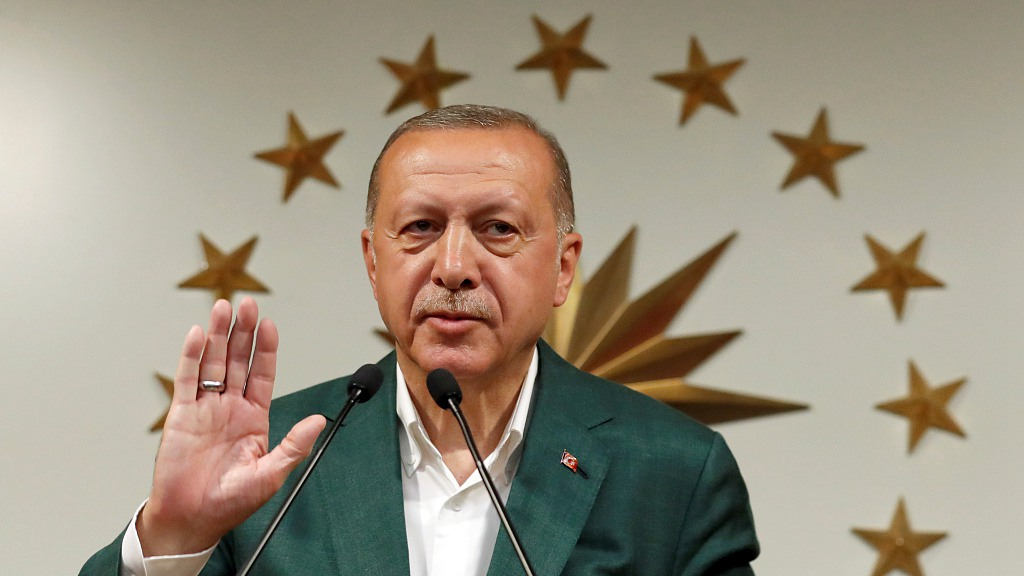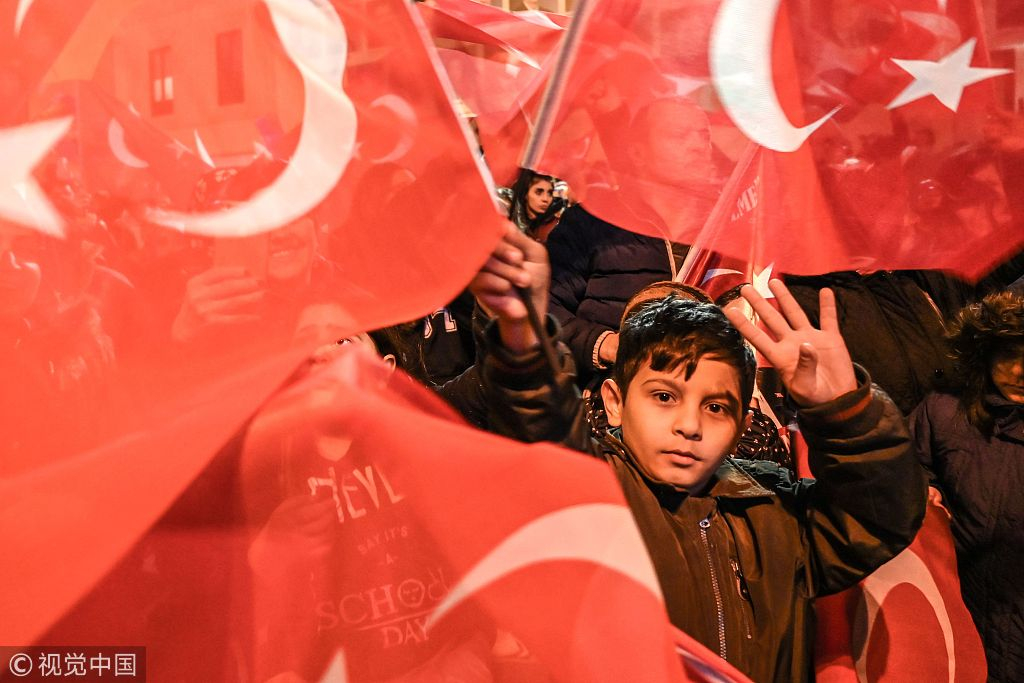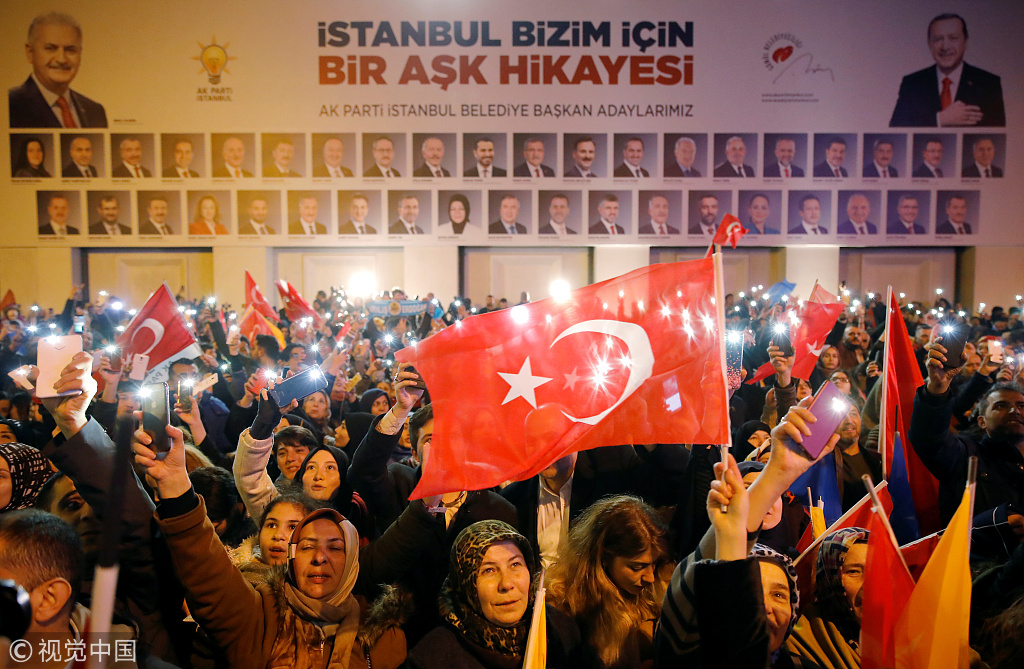
Opinion
18:06, 02-Apr-2019
Local elections reflect decline in Erdogan's popularity
Wang Jin

Editor’s note: Wang Jin is a research fellow at the Charhar Institute. The article reflects the author's opinion, and not necessarily the views of CGTN.
Unsurprisingly and surprisingly, the local elections marked a new beginning for Turkey's political arena. It is unsurprising because the local election shows that Turkey's President Recep Tayyip Erdogan and his Justice and Development Party (AKP) are not the dominating political force inside Turkey, largely due to the economic difficulties which erupted last year. It is surprising because very few before this local election expected that the AKP's decline would come so quickly.
As it is the first major election in Turkey since Erdogan assumed the presidency in 2018, this local election is perceived as an important opportunity to observe the popularity of both Erdogan and his AKP party. It is apparent that the AKP has encountered a major setback. According to the initial results, although the AKP still remains the biggest party in the local elections by earning 44.32 percent of the ballots, it loses its dominating status in the local municipal assembly. The Republic People's Party ranks second with more than 30 percent. The national turnout of about 83 percent is less than the 87.5 percent in the presidential election held in June last year.
A bigger challenge for the AKP and Erdogan is their loss of the major cities, including the capital Ankara and Istanbul. The fall of Istanbul is very decisive for the party. The very first political steps for Erdogan start from Istanbul. In 1994 Erdogan was elected as the mayor of Istanbul in the local election as a member of Islamist Welfare Party, which was under the supervision of Turkey's military forces. In his career of mayor in Istanbul, Erdogan was pragmatic in office, handling a series of issues, such as water supplies, traffic jams and pollution.

A child flashes the four-finger "Rabia sign" among supporters of Justice and Development Party (AKP) during a rally near the headquarters of the conservative AKP party in Istanbul, March 31, 2019. /VCG Photo
A child flashes the four-finger "Rabia sign" among supporters of Justice and Development Party (AKP) during a rally near the headquarters of the conservative AKP party in Istanbul, March 31, 2019. /VCG Photo
The experience as the mayor of Istanbul increased Erdogan's popularity at home, and although he was arrested and put into prison because of his sympathy for pan-Islam ideology, Erdogan was elected as the leader of AKP in 2001 and became Prime Minister of Turkey in March 2003. Therefore, Erdogan and AKP's fall in Istanbul not only would deprive the AKP of abundant income, but also shows the decreasing popularity of AKP and Erdogan among the Turkish public.
The major reason for the loss of AKP and Erdogan in the local election in Turkey could be attributed to economic hardship. Erdogan's political success in Turkey, to some extent, could be perceived as his successful economic reforms in the marketization and liberalization of Turkey's domestic economy in the 2000s that led to a high-speed economic development pace and helped him and his AKP government earn enough support. Meanwhile, Turkey's traditional positive ties with the West, especially with many European states, helped Turkey attract a large number of foreign investments and tourists, especially from Europe.
However, with the devaluation of Turkish currency lira in the second half of 2018, and the withdrawal of foreign investments from Turkey, Turkey's economy entered recession in late 2018. The GDP in 2018 only increased by 2.8 percent, which is much lower than the rate of 7.9 percent in 2017. With the deteriorating economy and the failures of the policies adopted by both Erdogan and his son-in-law Berat Albayrak, the Finance and Treasury Minister, Erdogan's political support at home has also decreased.

Supporters of AKP wave flags in Istanbul, Turkey, March 31, 2019. /VCG Photo
Supporters of AKP wave flags in Istanbul, Turkey, March 31, 2019. /VCG Photo
The other reason for the loss of popularity of Erdogan could be attributed to Turkey's government ties with Kurdish groups. Before Erodgan assumed power, he proclaimed the notion of negotiations with the Turkish Kurdish militant group, Kurdistan Workers' Party, and believed that the conflict between Turkish military forces and PKK in Southern Turkey should be settled through peaceful manner. After he assumed power, Erdogan tried to hold dialogue with the imprisoned PKK leader Abdullah Ocalan to settle the Kurdish issue in Turkey through a “democratic way.” For quite a long time, Erdogan received support from Kurds in Turkey.
However, when the Syria civil war erupted in 2011, the rise of Syrian Kurdish militant groups alarmed Erdogan and Ankara, while his decision to ally with some Islamic extremist groups in Syria, which were also hostile to Syrian Kurds, to fight against the Syrian government, transformed him from a “Kurds' friend” to “Kurds' hater.”
To enhance his political dominance in Turkey, Erdogan even cooperated with the right-wing Turkish nationalist party, the Nationalist Movement Party, helping to tarnish his image among Kurds in Turkey. Therefore, some Kurdish politicians such as Selahattin Demirtas and political groups such as the pro-Kurdish People's Democratic Party filled the vacuum left by Erdogan and assumed an important role in Turkey's political arena after 2015.
The loss of this local election does not mean the collapse of Erdogan and his AKP government dominance. After the failed military coup in the summer of 2016, Erdogan and his AKP government have gradually dominated Turkey's political arena through the state of emergency. However, this local election shows the decline of Erdogan's popularity among the public and could be perceived as an important indicator for Turkey's political arena.
(If you want to contribute and have specific expertise, please contact us at opinions@cgtn.com.)

SITEMAP
Copyright © 2018 CGTN. Beijing ICP prepared NO.16065310-3
Copyright © 2018 CGTN. Beijing ICP prepared NO.16065310-3